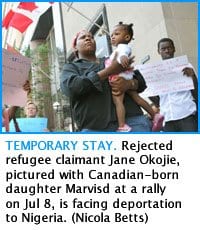Jane Okojie, a Nigerian woman who had been scheduled to be deported to Nigeria on Thu, Jul 10, has been granted a temporary deferral, allowing her to stay in Canada in the short term.
The deferral came as the result of a request made by Okojie’s lawyer to the removal officer handling her case.
Because the deferral is only temporary Okojie is still facing eventual deportation to Nigeria where she says she and her two children will face persecution because of her bisexuality.
“She’s very scared,” says Nastaran Roushan of the immigrant and refugee rights group No One Is Illegal, which held a rally in support of Okojie on Jul 8 in front of the offices of Citizenship and Immigration Canada. “She fears for her life. If she goes back with her children, she has no one there. Her family has shunned her because she is bisexual. She doesn’t have any money and nowhere to go. If she’s arrested [her children] will be without a mother. They’ll already face extreme discrimination because they were both born out of wedlock, and in fact, Samuel has already endured a lot of harassment while growing up there.”
A victim of sexual violence and domestic abuse in her home country, Okojie says she fled Nigeria after being beaten by locals in her village and detained in prison after it was discovered she was bisexual.
“In Nigeria things are very bad for lesbians and gay people,” says Okojie. “If you are a bisexual or lesbian or gay you can be stoned to death and you can be sentenced to prison for many many years. The government doesn’t care.”
Homosexuality in Nigeria is punishable by imprisonment of up to 14 years and homophobia within government ranks, police and local militia groups is considered to be widespread according to groups including Changing Attitude Nigeria (a network of queer and queer-friendly members within the Anglican Church) and Human Rights Watch. The country has been criticized by human rights organizations including Amnesty International over its record of queer and other human rights abuses. In 2006 the Nigerian justice minister proposed a bill that would have made it a crime to support queer advocacy groups or participate in a same-sex marriage ceremony and banned adoption by queers. The bill was brought before the house of the national assembly but was not passed.
After arriving in Canada in July 2003 with her then seven-year-old son Samuel, Okojie attempted to claim refugee status but was denied by the Immigration and Refugee Board of Canada (IRB) in August 2005. She has since received a negative pre-removal risk assessment decision (PRRA) — which means that an IRB member has concluded it’s safe for her to be returned to Nigeria — and has also been denied refugee status based on humanitarian and compassionate grounds. Since arriving in Canada Okojie has also given birth to a girl, Marvisd, who is now 18 months old.
“I don’t want to bring my daughter back to Nigeria to have people ostracize her,” says Okojie. “I don’t want people in my village to say, ‘Look at her, she is the child of a lesbian.’ It’s already bad enough for children who are born from unmarried mothers — people are always calling them bastards. But it would be worse for my daughter. I don’t want her to go through the torture that I had to go through there.”
Jesuorobo says he has many concerns about the way the decision was reached to reject Okojie’s application for refugee status.
“The individual that had initially assisted Jane with her PRRA application was not a member of CSIC [the Canadian Society of Immigration Consultants], nor was he a lawyer,” says Jesuorobo. “[Jane] also retained a lawyer to accompany her to the PRRA interview and when this lawyer attempted to clarify something with Jane he was ejected from the interview, leaving only this individual who was not a lawyer or a member of CSIC with her.
“In my opinion she was not adequately represented and she was refused her right to counsel because she should have been given the opportunity to obtain representation.”
Jesuorobo says his client is also afraid that her children’s medical conditions won’t get proper attention in Nigeria.
“Nigeria is a country that is notorious for having a completely broken medical system and sending the Canadian-born child to this environment ? she will not receive proper medical care,” he says.

 Why you can trust Xtra
Why you can trust Xtra


